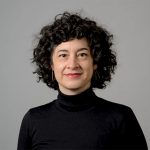
Congratulations to Laura Mauldin who was named a 2024 New America National Fellow! Learn more about Laura and her work here.

Congratulations to Laura Mauldin who was named a 2024 New America National Fellow! Learn more about Laura and her work here.
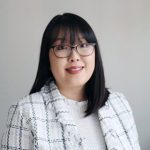 Malina Her is part of the CLAS Research and Teaching Scholars 2023 incoming cohort. Prior to her arrival at UConn, she completed her doctorate in Family Social Science at the University of Minnesota. Her research interests are in situating families within the context of culture and learning how families navigate transitions. She is particularly interested in how divorce impacts parenting practices, relationships, and dynamics within immigrant and refugee groups. Through her work she aims to center the voices of marginalized individuals and document the experiences of those often left out in research and history. She is a proud Hmong American, a Southeast Asian refugee group that has been in the US for about 50 years.
Malina Her is part of the CLAS Research and Teaching Scholars 2023 incoming cohort. Prior to her arrival at UConn, she completed her doctorate in Family Social Science at the University of Minnesota. Her research interests are in situating families within the context of culture and learning how families navigate transitions. She is particularly interested in how divorce impacts parenting practices, relationships, and dynamics within immigrant and refugee groups. Through her work she aims to center the voices of marginalized individuals and document the experiences of those often left out in research and history. She is a proud Hmong American, a Southeast Asian refugee group that has been in the US for about 50 years.
During her time at the University of Minnesota, Malina collaborated and worked closely with the local Hmong community to develop and launch the Divorced Hmong Parents Project (DHPP). Minnesota has a thriving immigrant population that allowed her to coordinate and collaborate with other Hmong scholars and members to develop this project. To her knowledge, this is one of the first times in written history that the stories of Hmong parents and their experiences with divorce, parenting, and navigating the US culture has been collected. Through this project and continued conversations with Hmong community members in Minnesota, Malina’s research program led her to seek how to adapt and evaluate resources targeting immigrant and refugee families. Now at UConn, she aims to continue this work by working closely with Dr. Beth Russell, the Director of the Center for Applied Research in Human Development (CARHD) in learning how to evaluate community-based programs.
Outside of work, Malina enjoys reading (particularly sci-fi and fantasy novels), spending time with her partner and family, visiting new restaurants, and cooking.
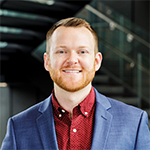 Associate Professor Ryan Watson featured in UConn Today for the latest results in the National LGBTQ+ Teen Survey. Read the article here.
Associate Professor Ryan Watson featured in UConn Today for the latest results in the National LGBTQ+ Teen Survey. Read the article here.
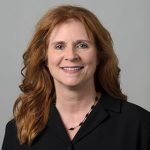
Connecticut Governor Ned Lamont visited an HDFS class in UConn Waterbury! Thanks to Associate Professor Laura Donorfio for opening her class to the governor and also the Commissioner of DCF. Read the article here.
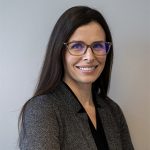 Rebecca Puhl was interviewed in an article about talking to your children about body and weight. Read the article here.
Rebecca Puhl was interviewed in an article about talking to your children about body and weight. Read the article here.
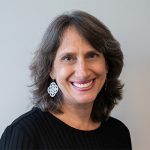 Professor Marlene Schwartz was quoted in a HealthDay article about how some schools have responded to child obesity by focusing on water intake. Read the article here.
Professor Marlene Schwartz was quoted in a HealthDay article about how some schools have responded to child obesity by focusing on water intake. Read the article here.
Caitlin was tenured and promoted to Associate Professor effective August, 2023!
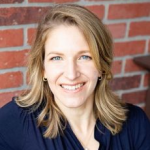
Caitlin Lombardi is an applied developmental psychologist. Her program of research falls at the convergence of social policy and child development with an overarching goal of understanding how social policy can best promote children’s healthy development and family well-being. She employs quantitative techniques using large nationally representative surveys of children and families to investigate central contributors to individual differences in children’s development and mechanisms within communities, schools, and families that explain differences in children’s cognitive, language, socioemotional, and health outcomes. In her recent work, she also utilizes mixed methods approaches to integrate quantitative and qualitative data. All of Caitlin’s work is informed by social science theories, which recognize strengths within individuals and families and the influences of social stratification and proximal and distal environmental characteristics on developmental processes. Taken together, her research seeks to document the processes through which socioeconomic and sociocultural experiences influence children’s development to inform social policies and programs that seek to support children and families.
Caitlin grew up in Maine and attended the University of Vermont (UVM) where she received a B.A. in English and Psychology. While at UVM, she was a rower on the crew team, tutor in the writing center, tour guide for the admissions office, and intern at the Vermont Commission on Women. Her interest in research and the role of policy in child development was sparked through the undergraduate honors program, where she wrote her senior honors thesis on educational inequalities in the K-12 schooling system. Following her undergraduate degree, she was a staff assistant and then a legislative staffer for U.S. Senator Patrick Leahy in his Washington D.C. office. In this position, she met with constituents, wrote correspondence, and drafted statements on health and social policy issues. Her interest in conducting research to inform these policies drew her to graduate school. She subsequently completed a Ph.D. in Applied Developmental and Educational Psychology at Boston College (BC), and then remained at BC for an additional two years as a Postdoctoral Fellow.
In 2016, Caitlin joined the UConn HDFS department as an Assistant Professor. At UConn, Caitlin teaches undergraduate and graduate courses on child development, policy, and research methods. She serves as a faculty member of the Early Childhood Program committee, which runs the Early Childhood Specializations (ECS) program. Caitlin is the Co-Chair of the Science and Social Policy Committee of the Society for Research in Child Development (SRCD) and is an Associate Editor for Applied Developmental Science. Funded by the federal government, the state of Connecticut, and private foundations, her research focuses on early care and education and children’s school readiness, the contributions of home environments to income-based achievement gaps, and the role of social policies in the health and development of children and families.
Outside of work, Caitlin enjoys spending time with her husband, Scott, and their three energetic children, ages 10, 8, and 5. She loves outdoor activities, especially time at the beach.
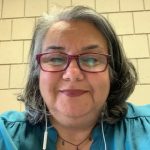
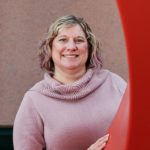
Visiting Assistant Professor Hilal Kuscul and Associate Professor Kari Adamsons received the 2023 Best New Professional Research Article Award from the National Council on Family Relations and the Men in Families Focus Group Award Review Committee for their paper, A Personal and Relational Model of Father Identity Construction, published in the Journal of Family Theory & Review.
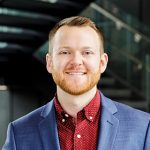 Associate Professor Ryan Watson was quoted in an article about schools banning LGBTQ+ subjects in school.
Associate Professor Ryan Watson was quoted in an article about schools banning LGBTQ+ subjects in school.
 Professor Marlene Schwartz was featured in UConn Today for her role as a co-investigator on a newly funded project from the CT Department of Public Health to study how the COVID-19 pandemic has affected obesity-related dietary behaviors and weight outcomes. Read the article here.
Professor Marlene Schwartz was featured in UConn Today for her role as a co-investigator on a newly funded project from the CT Department of Public Health to study how the COVID-19 pandemic has affected obesity-related dietary behaviors and weight outcomes. Read the article here.